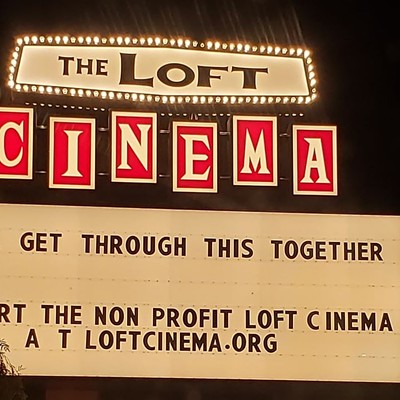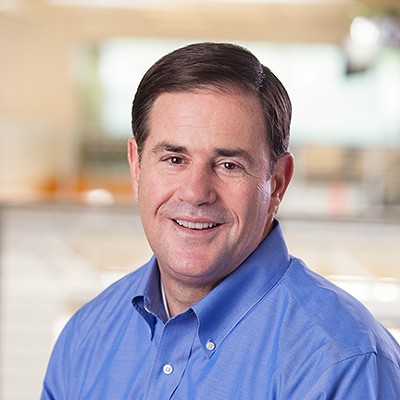With Gov. Jan Brewer stepping down, a half-dozen Republicans are running for the open gubernatorial seat in the Aug. 26 primary. Here are brief profiles of the candidates and a look at what's going on with their campaigns. We'll have more on the candidates and their proposals in the weeks ahead.
Ken Bennett
Arizona Secretary of State Ken Bennett has the most political experience of any of the candidates in the race. Bennett, 54, first ran for the Prescott City Council when he was just 25 years old in 1985. He went on to serve on the Arizona State Board of Education in the 1990s and started an eight-year career in the Arizona Senate after winning office in 1998, including a four-year stint as Senate president. In 2008, after Jan Brewer moved from secretary of state to the governor's office, she appointed Bennett as the new secretary of state and he won a full term in 2010. While holding office, Bennett also ran a family-owned business, Bennett Oil Company, until 2006.
Bennett credits his family for his interest in public service came from his family.
"Dad was on the City Council and in the Lion's Club," Bennett recalled. "Mom was PTA president and den mother and that kind of stuff. They were very active in the community and I have just kind of had that philosophy ingrained in me to contribute."
Bennett's platform includes improving schools (while opposing the Common Core learning standards), replacing the state income tax with an expanded sales tax, investing in infrastructure and reducing the regulatory burden on businesses.
Bennett said his legislative experience sets him apart from the other Republicans in the race.
"You have to learn to work with the Legislature," Bennett said. "I was president of the Senate when Janet Napolitano was governor and Republicans had the Legislature but there was a Democrat in the governor's house. We did some things we thought we pretty awesome and Napolitano got some things that she wanted, too."
Bennett is using the Clean Elections program to fund his campaign. He qualified for $753,000 for his primary campaign earlier this year.
Doug Ducey
After he retired from his job as CEO of Cold Stone Creamery, Doug Ducey decided he wanted to get into politics. He won the Arizona Treasurer's Office in 2010 and, to further boost his statewide profile, chaired the opposition to 2012's Prop 204, which would extended the state's temporary one-cent sales tax, with the proceeds dedicated primarily to education and transportation projects.
As he did when campaigning against the sales tax, Ducey has stressed during the campaign that the state government is more than big enough.
"I built a company," Ducey often tells voters on the campaign trail. "Now I want to shrink a government and grow an economy."
Ducey's priorities include cutting taxes (he promises a tax cut every year and wants to eliminate the state income tax if possible), reducing regulation, reducing the number of state employees, opposing federal control of education (including Common Core) and increasing state regulation of local school districts in areas such as spending and standards.
"This campaign is about big ideas," Ducey said. "We're running to get big things done."
Ducey came out strong earlier this year, announcing in January that he'd already raised a million dollars for exploratory campaign.
Ducey has assembled a team of heavy hitters to support him: Former U.S. senator John Kyl, Christian conservative über-lobbyist Cathi Herrod, Tucson Hispanic Chamber of Commerce President and CEO Lea Marquez Peterson.
Also unofficially in Ducey's corner: Sean Noble, a dark-money kingpin who moved $137 million through various political enterprises controlled by the Koch Brothers in 2012, according to a Pro Publica investigation published earlier this year. Noble has been linked to groups that have targeted other Republicans in the race, including Scott Smith and Christine Jones, as being too close to President Barack Obama or Hillary Clinton.
Scott Smith
After retiring from a job heading up a homebuilding company for about a decade, Scott Smith spent six years as mayor of Mesa, where he developed a reputation as a problem solver and networked well enough to be elected the president of the U.S. Conference of Mayors.
While the political process has sometimes been frustrating for him, he enjoyed learning how use the levers of government to improve the quality of life in Mesa even as he faced big budget deficits.
"I saw that if you focused on taking the community forward and bringing the people together and setting a vision and working a plan, it's a lot like business," Snith said.
If he's elected governor, Smith wants to create more jobs, improve education, fix the state's infrastructure and ensure public safety. "They all feed off each other, so that's why they are my top four," he said.
He acknowledged that the state is facing a structural deficit and state lawmakers will have to choose between more cuts or new ways of raising revenues.
"We need to have that discussion, as opposed to the political discussion, which is, 'I'm going to do whatever I can to spend as little as I can to do as little as I can' and then expect great results," Smith said. "That's what we do. We avoid the issue. We have the disease but we don't go to the doctor."
Smith has adopted positions on hot-button issues that put him at odds with the party's base. He is the only candidate in the race to support Gov. Jan Brewer's decision to expand the state's Medicaid program last year. The expansion was fiercely opposed by most Republican lawmakers and the GOP base because they viewed it as an expansion of Obamacare, but the healthcare industry and nearly all the chambers of commerce support it because it brought billions of federal dollars to the state to support hospitals, clinics and other healthcare providers.
Smith said that Brewer made the sensible call because of the numbers: "Look at the facts. To me, this isn't a political argument. It's a reality check. It's good to sit up there and pontificate about fighting against Washington. It's another thing to sit down and look at the hard facts, and I think the governor did that."
He also supports Arizona's version of the Common Core learning standards, saying that the opposition has mischaracterized standards that were developed by governors and the business community.
"The whole debate about Common Core has gotten to be so—I don't even know how to describe it," Smith said. "When I talk to five different people, I get five different definitions on Common Core. I support high standards. ... When I hear my opponents rail on Common Core, they're railing against something I don't see and I don't understand. I wouldn't be for the program that they're talking about."
Christine Jones
Christine Jones decided to get into politics after retiring from her job as general counsel for GoDaddy.com, the Scottsdale-based Internet giant that licenses domain names. Jones started working for the company in 2002, when it was still a start-up with a few dozen employees and left after it was sold in 2011.
Jones said she considered running for Congress or the U.S. Senate in recent years, but the timing wasn't right. But when she saw the open governor's seat, she decided it was time to get into the fray.
She said she's in the race because she has a vision unlike the other candidates.
"I really believe that in Arizona, we have an opportunity to cast a vision for the future, to focus on economic development and developing excellent models of education and enforcing immigration law," Jones said. "Just because I have this unique blend of life experiences and a desire to apply my leadership to the good of the state, I'm running for governor."
Jones' platform includes promises to grow jobs, cut taxes, protect the U.S. Constitution, oppose Common Core and battle illegal immigration. That final topic is a big focus on the campaign; last week, Jones released a border-protection plan that included a call for National Guard troops on the border and more state funding for Southern Arizona sheriffs, border-wall construction and surveillance cameras to detect border crossers, earning the endorsement of Pinal County Sheriff Paul Babeu.
"Our immigration laws have long been mocked," Jones said when she released her plan. "What's happening now is simply corruption. As Governor, I'll disrupt the corruption."
Jones has come under fire from various sides. She's been accused of padding her résumé for claiming ot have been a Los Angeles prosecutor when she was working as a clerk in the L.A. District Attorney's Office. A independent campaign committee that is supporting fellow Republican candidate Doug Ducey, Conservative Leadership for America, aired a TV spot saying that Jones was never an employee of the D.A.'s office, which was technically true, although she did work with prosecutors while attending law school in California.
She's also come under fire from a South Dakota-based political non-profit, Veterans for a Strong America, which has aired ads targeting Jones for a 2012 prediction that Hillary Clinton "will continue to stand out as a capable and respected leader." The resulting TV ad noted that Jones made her complimentary comments about Clinton after the attack on a diplomatic outpost in Benghazi.
The veterans group has ties to Arizona political operative Sean Noble, a Ducey ally who has fiercely defended the rights of the Koch Brothers and similar groups to launch anonymous attacks in the name of preserving American values.
Frank Riggs
Frank Riggs relishes being in the role of the underdog.
"I'm comfortable in that role," Riggs said in a recent interview with the Tucson Weekly.
The Army vet and former police officer had an unusual career in Congress in the 1990s, representing a Democratic district in California's Napa Valley area; he won his seat in 1990, lost it in 1992, won it back in 1994 and then held onto it for two terms before launching an unsuccessful run for U.S. Senate in 1998. He still enjoys telling stories about the House Bank overdraft scandal and his vote in favor of Bill Clinton's impeachment.
In 2002, Riggs moved to Maricopa County to head up an organization dedicated to providing education-management services for charter schools. He flirted with a gubernatorial run in 2006 but did not meet the five-year residency requirement.
Although he is not well known in Arizona political circles, Riggs decided to get into the crowded gubernatorial race because as he surveyed the field, he "didn't see anybody with my proven leadership experience and ability. I'm running against some wealthy establishment candidates with very, very thin records."
Riggs said that as governor, he'd focus on securing the border, opposing Common Core learning standards, reducing taxes, reversing Gov. Jan Brewer's expansion of Medicaid and, in general, blocking the "Obamanization" of Arizona.
Andrew Thomas
Two years after losing a 2002 statewide race for attorney general, Andrew Thomas won the post of Maricopa County attorney. During his six-year reign, Thomas forged an alliance with Maricopa County Sheriff Joe Arpaio and stretched the law to its limit to pursue indictments against undocumented immigrants.
He also used the prosecutorial power of his office to launch investigations into his political enemies, including Maricopa County officials, judges and members of the media. Newspaper publishers were locked up, judges faced trumped-up charges and county supervisors were indicted.
Thomas stepped down from his post in 2010 to again run for Arizona attorney, but he narrowly lost to current AG Tom Horne in the GOP primary. After his loss, Maricopa County settled lawsuits with some of the targets of his investigations for millions of dollars and the state bar stripped him of his law license for misusing the power of his office to pursue charges against his political foes.
One theme of Thomas' campaign has been the notion that he was unfairly targeted by the state's corrupt political system and the Obama administration; as he puts it on his website: "Why did liberal judges and their henchmen attack Andrew Thomas' law license for five years? Because he's a warrior who took on the establishment and stopped illegal immigration."
The issue of illegal immigration is also at the top of Thomas' campaign platform. At a forum last week, he declared that "very soon, all of our best-laid plans regarding health care, education and other issues frankly become meaningless. That is because this state is being overrun by foreign nationals who are exposing us to diseases, who are challenging our basic way of life and very few people are willing to stand up and do anything about it.
Thomas qualified for Clean Elections funding last week, which means he'll have $753,000 to spend on his primary campaign.















